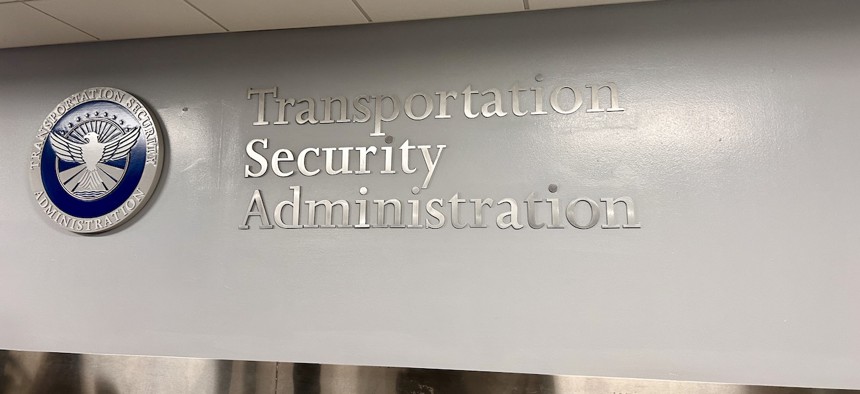
When TSA was formed, Congress gave the agency wide authority over its own personnel system, exempting its workers from federal union rules under Title 5. Lindsey Nicholson/UCG/Universal Images Group via Getty Images
TSA union urges judge to block ‘retaliatory’ order outlawing bargaining at agency
An attorney representing the Trump administration argued that U.S. District Judge Marsha Pechman did not have jurisdiction to hear the case and described the administration’s approach to labor groups as “a different management style.”
Attorneys for the union that represents frontline employees at the Transportation Security Administration on Tuesday argued that Homeland Security Secretary Kristi Noem’s March determination outlawing collective bargaining at the agency amounted to a violation of the labor group’s First Amendment rights.
In March, Noem issued a determination stripping TSA employees of their collective bargaining rights, arguing that union representation presented an impediment to responding “swiftly and effectively” to security threats and insinuating without evidence that the American Federation of Government Employees was wasting workers’ voluntary union dues.
Founded in the aftermath of the Sept. 11, 2001, terror attacks, Congress granted TSA broad latitude to administer its own personnel system, exempting the workforce from Title 5 of the U.S. Code, including the chapter governing union rights. The TSA workforce first received abridged collective bargaining rights under the Obama administration, and, citing longstanding low morale and poor attrition rates, the Biden administration applied most of Title 5’s provisions to the workforce in 2022.
Following the determination, TSA unilaterally sought to terminate its 2024 contract with AFGE, leading to the union filing a legal challenge in the U.S. District Court for the Western District of Washington. At a hearing to weigh the labor group’s request for a preliminary injunction to restore the collective bargaining agreement and employees’ rights, Abigail Carter, an attorney for the union, highlighted statements from Noem—as well as the White House in a subsequent effort to outlaw unions across two-thirds of the federal workforce—as evidence that the administration’s stated goals are a “pretext” for attacking a union that has challenged its policies in court.
“The administration made clear that the stripping of TSA employees’ collective bargaining rights is because of the union’s First Amendment activity,” said Abigail Carter, an attorney representing the American Federation of Government Employees during a hearing Tuesday. “[Noem] took note of the president’s executive orders and statements in her determination, showing she relied on them . . . The pattern of antagonism against AFGE for its First Amendment activities demonstrates retaliatory intent, and evidence of such a pattern supports causation.”
But Justice Department Attorney Brian Kipnis, argued that U.S. District Judge Marsha Pechman, a Clinton appointee, lacked jurisdiction in the case. In most instances, when a union in the federal government seeks to challenge an agency’s actions, they must first seek redress from the Federal Labor Relations Authority.
“Plaintiffs argue that they are not cognizable by the FLRA and accordingly are not required to bring their claims there and instead can do so in this court,” Kipnis said. “We reject both propositions. AFGE makes the assumption that they would be turned away, but it is important to recognize that is only an assumption. The one entity that can determine the jurisdiction of the FLRA is the FLRA itself, or an appellate court on review.”
But TSA, due to its workforce’s creation outside of the Title 5 of the U.S. Code, is not governed by the FLRA. Even when the Biden administration sought to convey the provisions of Title 5 onto TSA, officials concluded they could not grant employees access to the FLRA’s review scheme, absent the enactment of new legislation.
Pechman quizzed Kipnis on the unions’ retaliation claims, particularly the notion that some labor groups have been exempted from the administration’s anti-union policies for their perceived lack of resistance to the Trump administration’s workforce policies and linked it with President Trump’s executive actions targeting law firms.
“Plaintiffs have laid out circumstances that not all unions are banned, but basically the ones that are in opposition are the ones who are banned,” she said. “You know, this isn’t a pattern that you see? Attorneys who take opposition stances get banned, and those who do not don’t have those restrictions. Isn’t this a pattern that the White House has set up, and doesn’t that taint the thinking of the secretary?”
But Kipnis sought to downplay that characterization, instead suggesting that the White House simply has a “different management style” than its predecessors when it comes to unions.
“In this context, what you see from my perspective, what might be characterized as hostility to some extent between unions and management, that doesn’t necessarily impart a First Amendment violation,” Kipnis said. “In fact, if it always imparted a First Amendment violation, everything the government did with regard to unions would be viewed as a First Amendment violation, because it’s kind of a feature, not a bug.”
“Except that the previous leaders of the TSA have found unions are beneficial, and for years renewed their contracts because they found that was a better representation of their workers, made for a happier, more effective workforce and wanted their employees to feel well treated,” Pechman said.
Carter disputed Kipnis’ characterization of the administration’s actions as a natural outpouring of the at-times confrontational relationship between labor and management.
“This isn’t simply labor-management tension, your Honor,” she said. “This is, however, this administration’s way of doing business. It’s a way of doing business where unions who speak out against the administration’s domestic policy, or say things they don’t like, or file grievances or lawsuits, they lose their bargaining rights and their members lose their bargaining rights.”
Pechman declined to say how she might rule on the matter, except that her decision would be published within the next week.
How are these changes affecting you? Share your experience with us:
Erich Wagner: ewagner@govexec.com; Signal: ewagner.47
NEXT STORY: Appeals board creates new path to renew reversals of probationary firings







